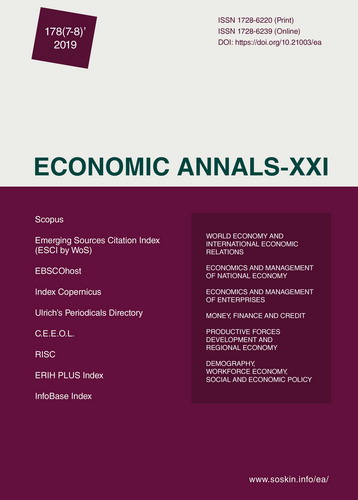Corruption and efficiency of public spending in states with various public management types
Corruption and efficiency of public spending in states with various public management types
Author(s): Bohdan Malyniak, Olesia Martyniuk, Olha KyrylenkoSubject(s): Governance, Public Finances, Fiscal Politics / Budgeting, Corruption - Transparency - Anti-Corruption
Published by: Institute of Society Transformation
Keywords: Public Spending; Public Expenses; Corruption; Public Services; Democracy; Authoritarian Regime; Political Regime; Public Goods; Budget;
Summary/Abstract: Prevalence of corruption distorts main social and economic relations in the country. Influence of corruption on various economic systems and social sphere are the object of study for many scientists. However, connection between corruption and efficiency of public spending in states with various regimes has not been studied. The study’s aim is to discover mutual dependency between corruption and efficiency of public spending in 165 countries for each regime type: «Fully free», «Flawed democracies», «Hybrid regime» and «Authoritarian», as well as figuring out the way parts of democracy influence estimations of occurrences of corruption and public spending efficiency. The regression analysis has been applied in the study, carried out through the least squares method, which included corruption level and parts of democracy as factor features. It is established that for the model of group of countries with «Fully free» regime and «Flawed democracy» regime determination coefficients are the greatest (0.81 and 0.83), and such countries have the highest influence of corruption on efficiency of public spending. Simultaneously, the largest growth of estimation of public spending efficiency (0.912), caused by reducing corruption level, was in the authoritarian countries, the lowest growth of estimation of efficiency (0.771) was registered in fully free democratic countries. The study shows that public spending efficiency estimation, which corresponds to average corruption level (this is zero corruption level by expert scale), is higher (0.213) for fully free democracy countries, than the same estimation for less democratic countries. Corruption level has stronger impact on the efficiency of public spending estimation than level of democracy in four groups of countries with various types of regimes, although for fully free countries it is influenced by voting process and pluralism significantly. Study’s findings improve forecast of anticorruption policy results for public spending efficiency in the countries with various regimes. We consider that the prospects for further research in this area are to find out more about the link between corruption and the public spending efficiency.
Journal: Економічний часопис - ХХІ
- Issue Year: 178/2019
- Issue No: 7-8
- Page Range: 17-27
- Page Count: 11
- Language: English

